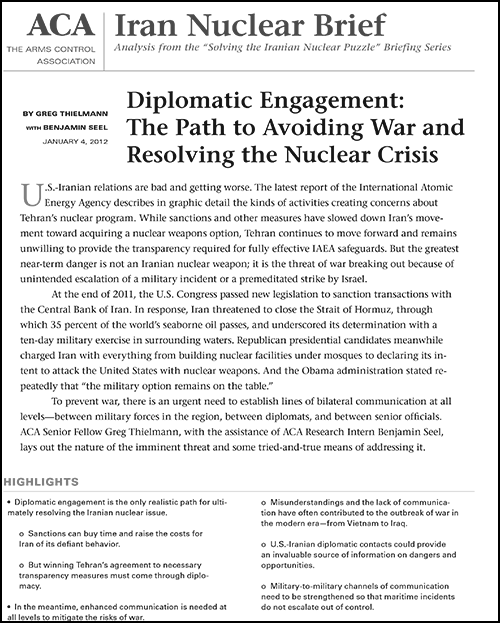January 4, 2012
By Greg Thielmann
 |
| Download PDF |
U.S.-Iranian relations are bad and getting worse. The New Year has opened with rising tensions between the United States and Iran and an increased prospect of war—either intentional or accidental.
The Nov. 2011 report of the International Atomic Energy Agency details why the international community remains deeply concerned about Tehran’s nuclear ambitions. While sanctions and other measures have slowed down Iran’s movement toward acquiring a nuclear weapons option, Tehran continues to improve its nuclear capabilities and has so far refused to implement the confidence-building steps necessary to ensure it is not pursuing nuclear weapons.
The latest round of U.S. unilateral sanctions has been met with Iranian threats of closing the Straits of Hormuz through which 35% of the world’s seaborne oil passes. Iran reinforced those threats with ten days of military exercises in nearby waters that included launches of anti-ship missiles. These and other developments highlight how relatively minor incidents could quickly escalate into a major military conflict.
At the same time, Iran proposed on December 31 a new round of talks with the P5+1 group of nations, suggesting that that diplomatic options to resolve the nuclear concerns about its nuclear activities have not been exhausted.
In the following Iran Nuclear Brief, ACA Senior Fellow Greg Thielmann argues that in order to avoid unintentional conflict with Iran, there is an urgent need to establish better lines of bilateral communication at all levels—between military forces in the region, between diplomats, and between senior officials. Thielmann also explains why pragmatic diplomatic engagement is essential to a successful strategy to prevent a nuclear-armed Iran.
Additional presentations and analyses from ACA’s "Solving the Iranian Nuclear Puzzle" project are available here.
